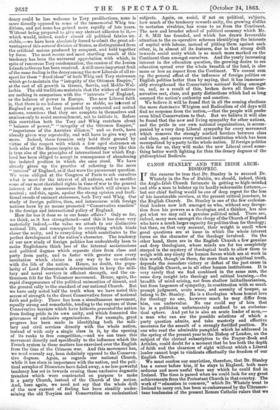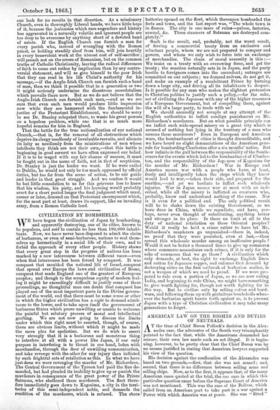CANON STANLEY AND THE IRISH ARCH- BISHOPRIC.
Ithe rumour be true that Dr. Stanley is to succeed Dr. 1 Whately in the See of Dublin, we should, indeed, think the Anglo-Irish Church fortunate in getting so high-minded and able a man to bolster up its hardly redeemable fortunes,— but our chief feeling would be one of deep regret for the- loss of his inestimable services, at the present critical juncture, to the English Church. Dr. Stanley is one of the few ecclesias- tical leaders now left amongst us who, without any deroga- tion from his powers as a theologian and a thinker, has also got what we may call a genuine political mind. There are, indeed, many men amongst the clergy of the Church of England. who have a much larger capacity for politics than for theology; but then, on that very account, their weight is small when great questions are at issue in which the whole interest turns on the character of the theology involved. On the other hand, there are in the English Church a few genuine and deep theologians, whose minds are far too completely steeped in the mystery of theological truth to allow them to weigh with any nicety the human forces which are at work in this world, though-on them, far more than on spiritual truth, depends the immediate victory or defeat of the just cause in. the English Church, as in all other human institutions. It is very rarely that we find combined in the same man, the same deep insight into theology and critical learning,—the breadth of mind arising, not from shallow latitudinarianism, but from largeness of sympathy, in combination with so much prompt judgment, acute sense, and serenity of temper, as belong to Dr. Stanley. He is a theologian whose honest love for theology no one, however much he may differ from him, can undervalue. No one could say of him that he is a politician unfortunately confined to an ecclesias- tical sphere. And yet he is also an acute leader of men,— a man who can see the possible solutions of which a party question admits, and take masterly and effective measures for the assault of a strongly fortified position. No one who read the admirable pamphlet which he addressed in the spring of the present year to the Bishop of London, on the subject of the clerical subscription to the Prayer-Book and Articles, could doubt for a moment that he has both the depth of faith and the clearness of sight without which a Liberal leader cannot hope to vindicate effectually the freedom of our English Church. We must confess our conviction, therefore, that Dr. Stanley has a career before him, if he stays in England, both more arduous and more useful than any which he could find in Ireland. The time is passed when we could look for any great achievements from the Protestant Church in that country. The work of " education in common," which Dr. Whately went to- Ireland to carry out, has been so embarrassed by the Ultramon- tane tendencies of the present Roman Catholic rulers that we can look for no results in that direction. As a missionary Church, even in thoroughly Liberal hands, we have little hope of it, because the jealousies which race engenders and history has aggravated in a naturally volatile and ignorant people are too deep to be overcome by anything short of a devoted band of saints. If the English Church can furnish a man for every parish who, instead of wrangling with the Roman priest, or holding steadily aloof from him, will join heartily in every beneftlent work at the utmost cost of self-sacrifice ; will preach not on the errors of Romanism, but on the common truths of Catholic Christianity, leaving the radical differences of faith to come out rather by implication than by any contro- versial statement, and will so give himself to the poor Irish that they can read in his life Christ's authority for his message,—if the Anglo-Irish Church can furnish such a band of men, then we think it possible that in a generation or two it might seriously undermine the disastrous sacerdotalism which prevails there now. But as we do not believe that the Anglo-Irish Church can furnish such men,—and as we are sere that even such men would produce little impression now while they are hampered with the fundamental in- justice of the Protestant Establishment, we should be sorry to see Dr. Stanley relegated there, to waste his great powers on a hopeless problem, while one that is so much more hopeful remains for him in England. That the battle for the true nationalization of our national Church,—that is, for the removal of all obstructions which deprive its clergy needlessly of invaluable recruits, and alienate its laity as needlessly from the ministrations of men whose intellects they think are not their own,—that this battle is beginning in good earnest we have often expressed our belief. If it is to be waged with any fair chance of success, it must be fought out in the name of faith, not in that of scepticism. Dr. Stanley is just the leader we want. If he were exiled to Dublin, he would not only be too much oppressed by official duties, but too far from the scene of action, to be our guide and leader in that great struggle. And we confess it would be but little consolation to us for this grievous loss to know that his wisdom, his piety, and his learning would probably avert for a short period longer the final judgment which must, sooner or later, descend on that Protestant encampment which, for the most part at least, draws its support, like an invading army, from a Roman Catholic land.































 Previous page
Previous page